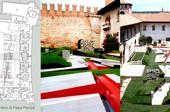
Section of Landscape Architecture
Kolegiji
"How widely different cultural systems have invoked gardens in their sustaining narratives; how these myths of garden creation and garden consumption have proliferated in human experience—they can be tracked so easily, though nobody has done it strenuously, through the arts of painting and poetry. So we need to argue more vigorously and rigorously for gardens as a central, essential expression of cultural and social life and therefore not a theme to be left to those who see them as peripheral, let alone charmingly peripheral, to some other activity."
John Dixon Hunt
Landscape Architecture Section covers the thematic area of landscape architecture.
Landscape architecture is a discipline that focuses on interventions in the landscape through activities of design, planning and management. Landscape is defined as an outdoor space, environment and relationship between people and a place. Landscape Architecture deals with landscapes of all types, both urban and rural, and on all scales - from gardens to regions.
Through mandatory and optional courses and workshops, the sensitivity toward reading and recognition of spatial values is promoted, as well as their enhancement with respect for inherited identity and creating new values through contemporary architectural and landscape interventions.
The programme of the Landscape Architecture Section focuses on projects concerned with building a sustainable future for the landscape we inhabit.
Social processes - political, economic, urban and other - are non-linear and dynamic, and complex systems emerge from them. Landscape architecture can serve this new paradigm, working on ecological theory and on the tradition of diversity that is shaped in verbal and visual discourse with respect to parks and cities. Today, the area of research and work is expanding on infrastructure, post-industrial spaces, landfills, urban areas, and "spaces in-between".
The knowledge and role of architects and urbanists in the area of landscape architecture is unavoidable and the role of education involves the development of critical insight into space and the creation of new knowledge. The Landscape Architecture Section is intensely working on creating this new knowledge by applying an interdisciplinary approach, and by affirming the historical and the contemporary, the natural and the ecological, the architectonic and landscape, the urban and the socially active.
John Dixon Hunt
Landscape Architecture Section covers the thematic area of landscape architecture.
Landscape architecture is a discipline that focuses on interventions in the landscape through activities of design, planning and management. Landscape is defined as an outdoor space, environment and relationship between people and a place. Landscape Architecture deals with landscapes of all types, both urban and rural, and on all scales - from gardens to regions.
Through mandatory and optional courses and workshops, the sensitivity toward reading and recognition of spatial values is promoted, as well as their enhancement with respect for inherited identity and creating new values through contemporary architectural and landscape interventions.
The programme of the Landscape Architecture Section focuses on projects concerned with building a sustainable future for the landscape we inhabit.
Social processes - political, economic, urban and other - are non-linear and dynamic, and complex systems emerge from them. Landscape architecture can serve this new paradigm, working on ecological theory and on the tradition of diversity that is shaped in verbal and visual discourse with respect to parks and cities. Today, the area of research and work is expanding on infrastructure, post-industrial spaces, landfills, urban areas, and "spaces in-between".
The knowledge and role of architects and urbanists in the area of landscape architecture is unavoidable and the role of education involves the development of critical insight into space and the creation of new knowledge. The Landscape Architecture Section is intensely working on creating this new knowledge by applying an interdisciplinary approach, and by affirming the historical and the contemporary, the natural and the ecological, the architectonic and landscape, the urban and the socially active.































































.jpg)










